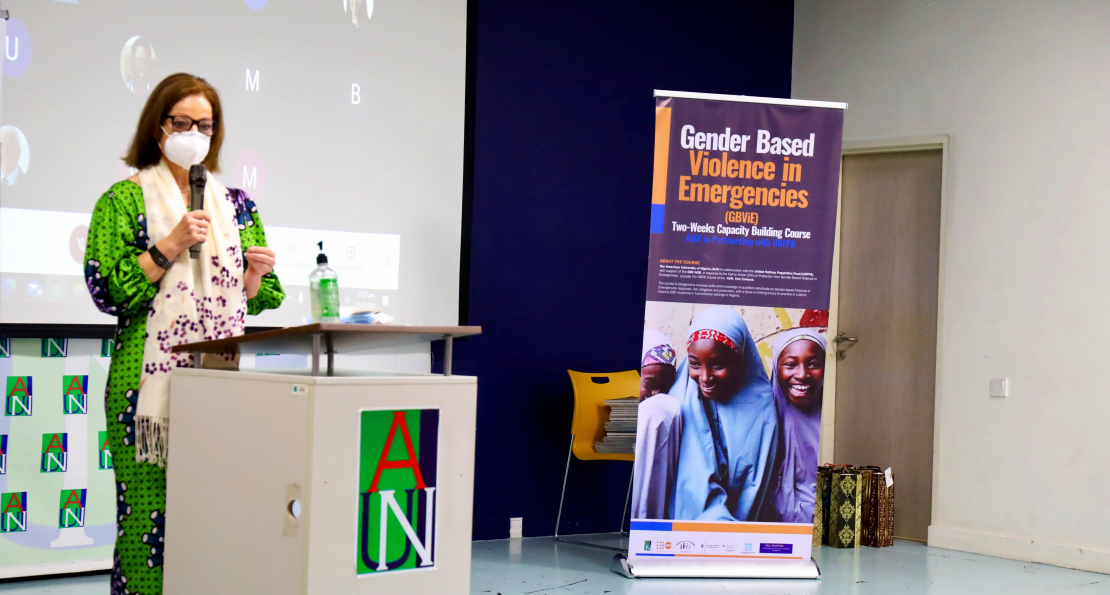Over ten thousand incidences of gender-based violence are reported daily in Nigeria, with the COVID-19 pandemic, gender based violence shifted from being an emergency in some states to becoming a national emergency. The gravity of the situation spurred the American University of Nigeria (AUN) to build capacity of practitioners in the field.
AUN in partnership with the United Nations Population Find(UNFPA) on Friday 19th March 2021, concluded a two-week Gender-Based Violence in Emergencies (GBViE) training. The first and second cohorts of this course were held in November 2019 and July 2020 respectively.
25 participants were drawn from different parts of the country. With others joining in from Iraq, Afghanistan, Libya, and Syria virtually.The training was organized to build knowledge and experience on how to end gender-based violence.
The Chairperson, Planning Commission, Adamawa State, Dr Mary Paninga, was a special guest of honour at the event.
"There is a very high prevalence of Gender-Based Violence (GBV) in Nigeria and we've seen an increase during COVID-19. So it is important now more than ever, that we put all our joint resources together in order to find a way to end it. American University of Nigeria (AUN) is the one place in the entire West/ Central Africa where we are able to facilitate the course about Gender-Based Violence in Emergencies (GBViE)."Said Dr. Paninga.
For the past two weeks at AUN, the participants have connected with professionals in Nigeria, regional offices in Senegal, and they have had guest facilitators from across the world.
"It was truly a global course where we brought in experiences from all over the world in order to create synergies so we can elaborate on the knowledge we have as we try to end GBV, and we will war relentlessly to end GBV by 2030," said Dr Paninga.
One of the participants, Ms Elizabeth Ogunleye was elated about the prospects the training will give her.
"It's been a pleasurable moment learning about GBViE in the past two weeks, and no doubt, it's been very engaging and very tasking. Talking about the community engagement, the classroom walk amongst others, it's been a time to learn, unlearn and relearn."
Ms Ogunleye also encouraged her fellow participants to incorporate what they have learnt into their areas of practices; that is, they should be able to manage GBV using the core principles they learnt in the training vis-à-vis safety, respect, confidentiality, non-discrimination, and management of GBV survivors.
The UNFPA Country Representative, Ms Ulla Mueller, congratulated the participants for their accomplishments.
”I'm delighted to be with you today here in Yola at the American University of Nigeria to celebrate your achievements. So, thank you for having me!... This training is really relevant because GBV is no longer only an emergency situation in some states in Nigeria; it's now a national emergency." Said Ms. Mueller.
Dr Erebi Ndoni, one of the course facilitators, gave a vote of thanks on behalf of AUN and UNFPA. She expressed her gratitude to everyone.
"Grace to you, UNFPA! The presence of the country resident representative shows the importance that is attached to this program. I say a big thank you. And then to the AUN learning community: thank you for your unwavering support for this course. I also specially thank the outgoing president of the American University of Nigeria, Dr. Dawn Dekle. It was under her leadership that this course commensed and has grown to what it is now.
As a development University, AUN is committed to impacting on communities positively. Providing solutions and building knowledge on key issues in society is one of the university's core philosophies. With the GBViE course, AUN is not only providing practical solutions to stem the tide of violence, but also providing field practitioners with a veritable skill set to prevent incidences of gender-based violence.
Reported by Esther Onyinye Ofeli


